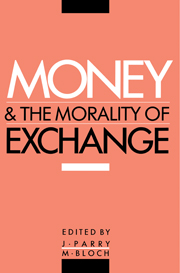Book contents
- Frontmatter
- Contents
- List of contributors
- 1 Introduction: Money and the morality of exchange
- 2 Misconceiving the grain heap: a critique of the concept of the Indian jajmani system
- 3 On the moral perils of exchange
- 4 Money, men and women
- 5 Cooking money: gender and the symbolic transformation of means of exchange in a Malay fishing community
- 6 Drinking cash: the purification of money through ceremonial exchange in Fiji
- 7 The symbolism of money in Imerina
- 8 Resistance to the present by the past: mediums and money in Zimbabwe
- 9 Precious metals in the Andean moral economy
- 10 The earth and the state: the sources and meanings of money in Northern Potosí, Bolivia
- Index
7 - The symbolism of money in Imerina
Published online by Cambridge University Press: 20 February 2010
- Frontmatter
- Contents
- List of contributors
- 1 Introduction: Money and the morality of exchange
- 2 Misconceiving the grain heap: a critique of the concept of the Indian jajmani system
- 3 On the moral perils of exchange
- 4 Money, men and women
- 5 Cooking money: gender and the symbolic transformation of means of exchange in a Malay fishing community
- 6 Drinking cash: the purification of money through ceremonial exchange in Fiji
- 7 The symbolism of money in Imerina
- 8 Resistance to the present by the past: mediums and money in Zimbabwe
- 9 Precious metals in the Andean moral economy
- 10 The earth and the state: the sources and meanings of money in Northern Potosí, Bolivia
- Index
Summary
One of the more disturbing moments of my field work occurred at the very end of my first period with the Merina of central Madagascar. As I was about to leave, the head of the family in which I had become partly integrated, presented to me a significant sum of money in Malagasy bank notes. These were intended to help me on my journey and perhaps also to be used when I arrived back in England. The cause of my embarrassment, I told myself at the time, was the difficulty I felt in receiving money from people who were clearly much poorer than myself. Another element was perhaps the recurrent sense of guilt of fieldworkers who feel that they are putting a relationship of mutual moral obligation to quite another purpose. This is made all the worse by the suspicion that the fieldworker benefits from this in a way which does not include the other party in the relationship.
However, as I think back over this episode, which was to repeat itself on my subsequent visits, I am not sure that my worries were not really of a different nature. The moral problem of the fieldwork relationship I had partly resolved at the time, by having made what I was doing as clear as I could. The problem of taking from people who were poorer than me was also an unsatisfactory explanation. First of all I am not sure that it was literally true in this particular case.
- Type
- Chapter
- Information
- Money and the Morality of Exchange , pp. 165 - 190Publisher: Cambridge University PressPrint publication year: 1989
- 40
- Cited by



